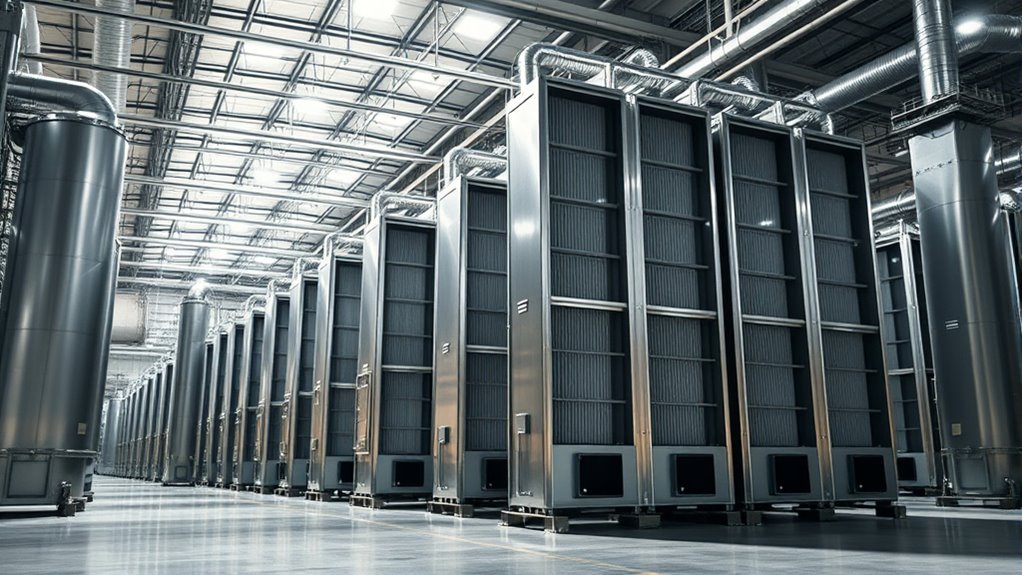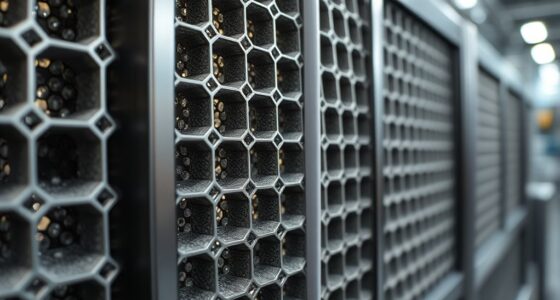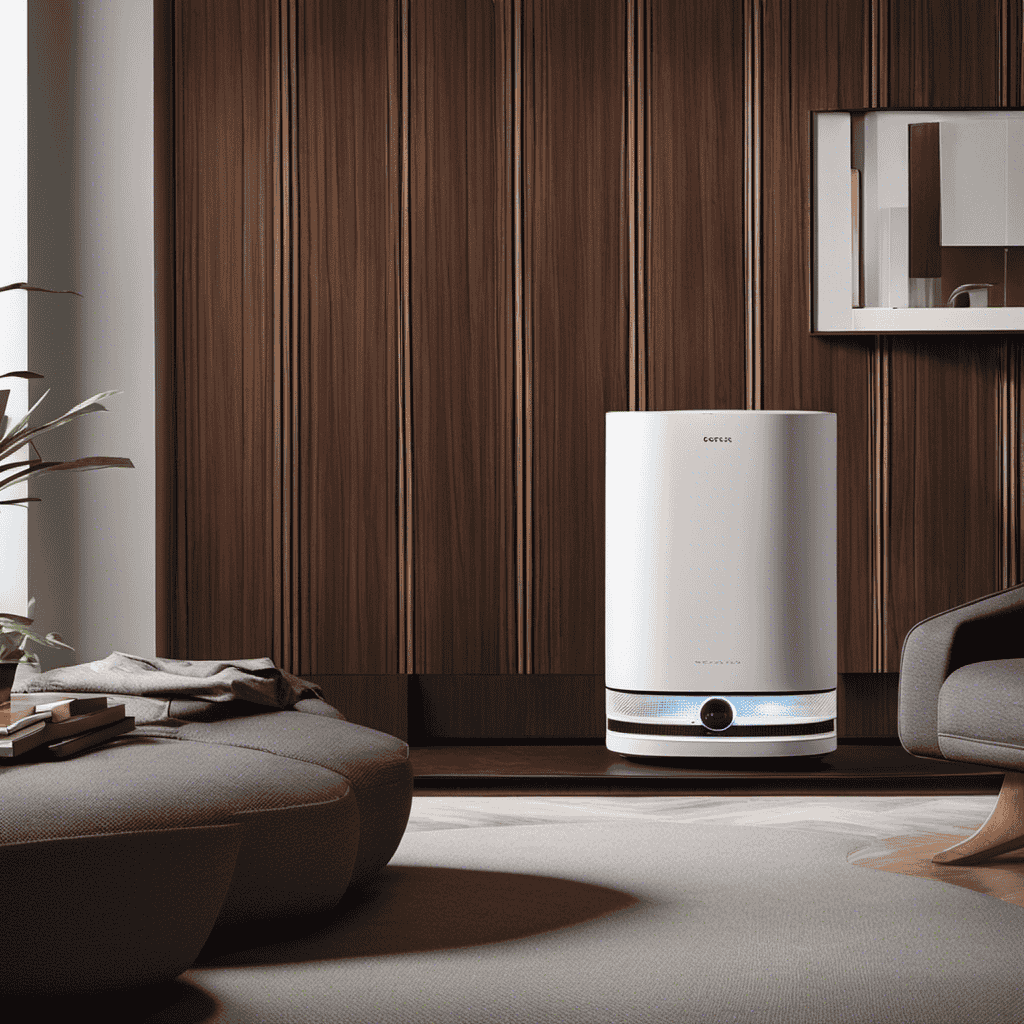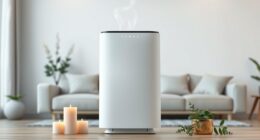If your warehouse handles sensitive goods or has high dust or airborne hazards, industrial HEPA towers are a necessary investment to protect your environment and staff. They efficiently remove airborne contaminants, improve air quality, and reduce health risks. While they may seem costly, the benefits of safer, cleaner space often outweigh initial expenses. To discover whether they suit your specific needs and how they can enhance your operations, keep exploring these options.
Key Takeaways
- HEPA towers ensure high filtration efficiency, essential in environments with sensitive products or strict health standards.
- They improve air quality, reducing respiratory issues and enhancing worker safety in large warehouses.
- Operational costs are justified in high-risk settings due to contamination prevention and regulatory compliance.
- In low-risk environments, HEPA towers may be unnecessary, making them potentially overkill.
- The decision depends on specific warehouse needs, with benefits often outweighing costs in demanding conditions.
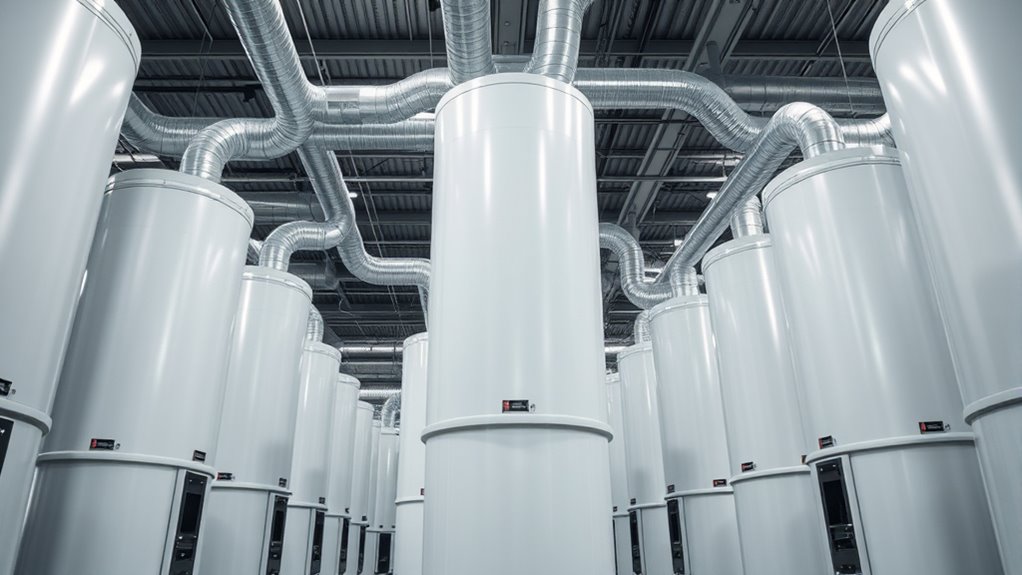
Industrial HEPA towers are essential air purification systems designed to remove airborne contaminants in large-scale environments. When you’re managing a warehouse, maintaining optimal air quality isn’t just about comfort; it’s about safety, productivity, and compliance. HEPA towers play a vital role because they are engineered to capture 99.97% of particles as small as 0.3 microns, ensuring filtration efficiency that meets strict standards. If you’re considering installing these systems, understanding their impact on air quality can help you decide if they’re overkill or a necessary investment.
Industrial HEPA towers ensure high-efficiency air filtration critical for safety and compliance in large warehouses.
In a warehouse setting, air quality directly influences worker health and operational efficiency. Dust, allergens, bacteria, and volatile organic compounds can circulate freely without proper filtration, leading to respiratory issues, allergies, and increased absenteeism. HEPA towers continuously draw in contaminated air, filter out harmful particles, and release cleaner air back into your environment. This process considerably reduces airborne pollutants, creating a healthier workspace. The filtration efficiency of HEPA towers means you can trust that even microscopic contaminants don’t escape, making them a reliable solution for maintaining high air quality standards. Additionally, choosing the right projector technology can enhance safety by providing clear visibility and reducing hazards caused by poor lighting.
Some might argue that installing industrial HEPA towers is overkill, especially for smaller or less contaminated spaces. However, in large warehouses where airflow and contaminant levels can fluctuate widely, relying solely on basic ventilation may not suffice. These towers provide consistent, high-grade filtration that can handle large volumes of air and demanding environments. If your warehouse stores sensitive goods, pharmaceuticals, or electronics, or if you’re trying to meet strict health regulations, the investment in HEPA towers becomes a necessity rather than an overreach.
On the other hand, consider the operational costs—these systems require energy to run continuously, and maintenance involves replacing filters regularly. If your warehouse has minimal dust or airborne hazards, simpler filtration methods might be enough. But for high-volume, high-risk environments, the benefits of enhanced air quality and filtration efficiency outweigh these costs. You’re effectively reducing the risk of contamination, improving worker safety, and potentially avoiding costly shutdowns caused by poor air conditions.
Ultimately, whether HEPA towers are overkill or a necessity depends on your specific environment and needs. If you prioritize safety, compliance, and a healthier workspace, investing in these systems is a strategic move. They deliver unmatched filtration efficiency and help you control your air quality more effectively. While they might seem like a big step upfront, the long-term benefits in terms of safety and productivity can make them an indispensable part of your warehouse operations.
Frequently Asked Questions
How Do HEPA Towers Compare to Traditional Air Filtration Methods?
You’ll find that HEPA towers outperform traditional air filtration methods in maintaining air quality. They offer higher filtration efficiency, capturing tiny particles like allergens and pathogens more effectively. Unlike standard filters, HEPA towers actively circulate and clean large spaces quickly, making them ideal for environments requiring superior air quality. If you prioritize clean, safe air, investing in HEPA towers is a smart move, ensuring better filtration efficiency than conventional options.
What Maintenance Is Required for Industrial HEPA Towers?
Think of maintaining your HEPA tower like tending a garden—you need to regularly check on it. You’ll need to replace air filters as recommended to guarantee ideal filtration. Routine system troubleshooting helps catch issues early, preventing breakdowns. Keep an eye on airflow and noise levels, and clean pre-filters often. Proper maintenance keeps your industrial HEPA tower running smoothly, so it continues to protect your warehouse environment effectively.
Are HEPA Towers Suitable for All Warehouse Sizes?
You might wonder if HEPA towers suit your warehouse size. They’re ideal for improving warehouse ventilation and maintaining high air quality, especially in large spaces or environments requiring strict cleanliness. For smaller warehouses, they might be more than necessary. Consider your air quality monitoring needs and space dimensions to determine if a HEPA tower fits your requirements. Proper assessment guarantees you invest wisely in effective air filtration solutions.
How Cost-Effective Are HEPA Towers Over Time?
Imagine planting a seed that grows into a sturdy oak—initial costs seem high, but long-term savings flourish. HEPA towers, though an upfront investment, can markedly reduce health-related costs and improve air quality. Over time, they become a crucial long-term investment, leading to cost savings through fewer sick days and enhanced safety. Their durability and efficiency make HEPA towers cost-effective, proving their value beyond the initial expense.
Do HEPA Towers Eliminate All Warehouse Airborne Contaminants?
HEPA towers considerably reduce airborne bacteria and odors in warehouses, but they don’t eliminate all contaminants. You’ll notice improved air quality, yet some particles and gases might still linger. These towers are highly effective at capturing most airborne bacteria and controlling odors, making your environment safer and fresher. However, for complete elimination, consider combining HEPA towers with other ventilation or filtration systems for ideal air purity.
Conclusion
Like Icarus reaching too close to the sun, relying on industrial HEPA towers might seem like overkill, but in certain warehouses, they’re your safety wings. They guarantee clean, safe environments, much like Athena’s wisdom guards her city. Whether you see them as necessary guardians or excess, remember, in the domain of industrial air quality, sometimes going the extra mile keeps you soaring above the rest. Choose wisely—your warehouse’s health depends on it.
